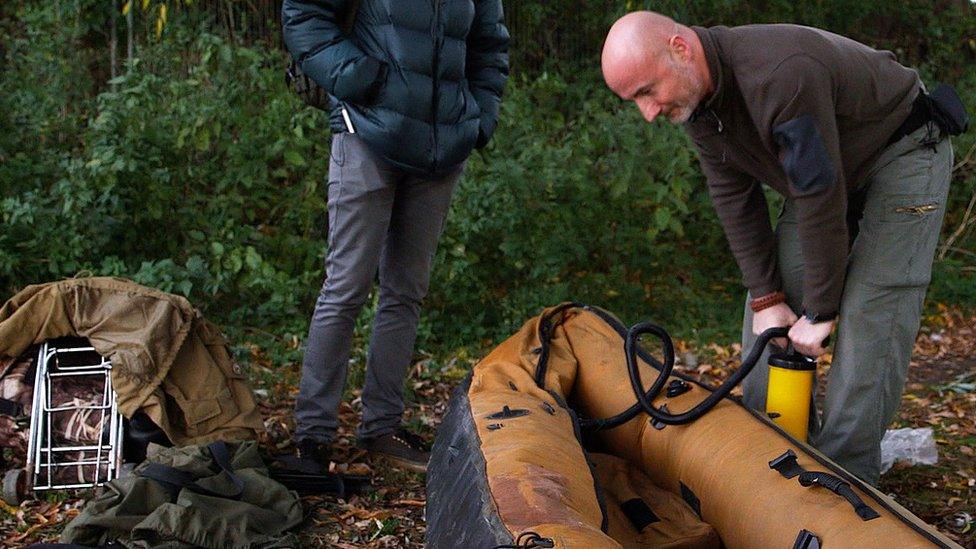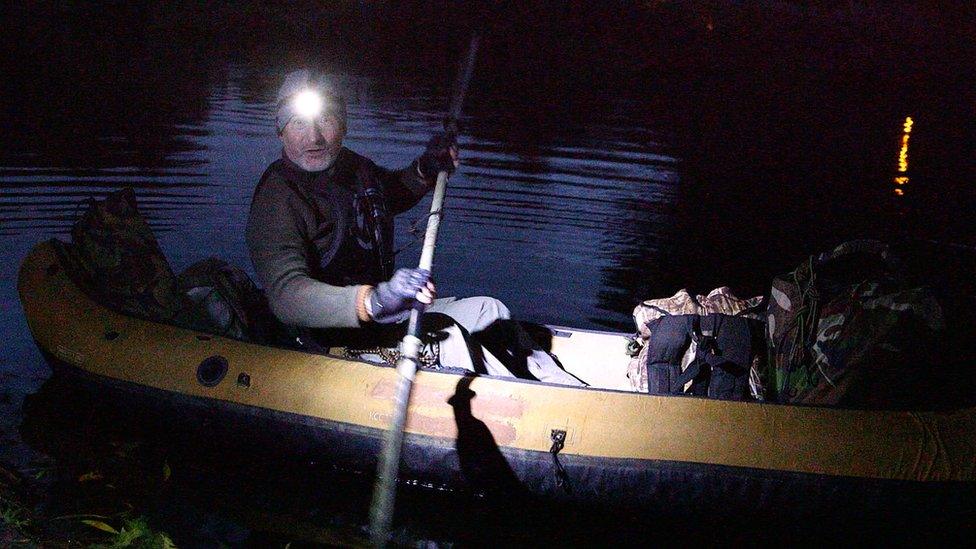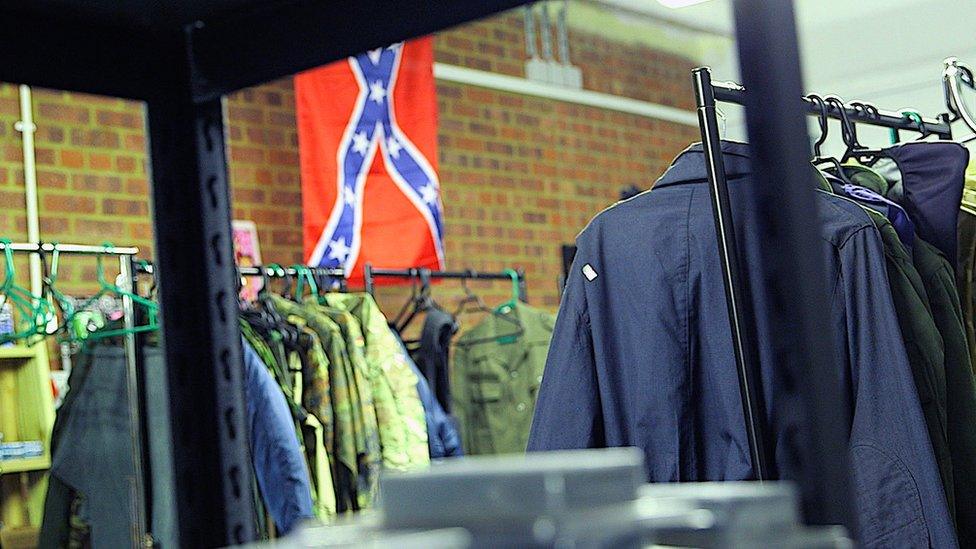The British people preparing for the end of the world
- Published

In the event of a catastrophe, prepper Peter Stanford plans to take to the waterways in his canoe.
British survivalists - known as "preppers" - are fixated on the need to survive in the event of a catastrophe. What motivates them?
Beside a stream in the middle of the Bedfordshire countryside, Peter Stanford - who describes himself as a motivational life coach - is pumping up his inflatable canoe by hand.
This is his chosen method of transport for escaping an "apocalyptic situation", which he views as anything from a financial crash to a repeat of the London riots.
"I'm not living on a knife-edge waiting for a catastrophe to happen," he explains.
Stanford is hoping to take to water after sunset - under the cover of darkness - to practise what might happen if he needed to flee. He believes this would be the optimal time of day to make his escape, so as not to be seen by others who might wish to steal his resources.

He has already invested in a second canoe so that his son and former partner can join him.
"We do have strategies and a location in place where certain family members could actually meet up," he admits, keen to stress he would never force his son to partake in his long-term interest.
Stanford's decision to "prep" was sparked almost 20 years ago after hearing the first-hand experiences of friends in the armed forces, who had seen parts of the world devastated by war.

Find out more
Watch Benjamin Zand's full film about British preppers on the Victoria Derbyshire programme website.

This military theme runs throughout large parts of the prepping community - including in its survivalist attitude.
In a farm in Bedfordshire, prepper Lincoln Miles shows off what he says is Europe's only prepping shop, where he sells everything from crossbows to clothes designed to help people survive in the case of nuclear disaster.
"I created the shop to match the growing demand," he explains. It is difficult to know how many preppers there are in the UK as most keep their activities behind closed doors so as not to be recognised, but anecdotally the community is believed to be growing.
Benjamin Zand looks inside Europe's only shop for 'preppers'
Miles's shop is littered with knives, displayed in almost every corner of the store. Most are illegal to carry without good reason, something it would be difficult for preppers to claim they possess.
These weapons, however, are not the only controversial items in the shop. Hanging proudly at the back is the Confederate flag.
"I see it as a symbol of freedom and detachment from the government," Miles explains.
The flag is also tattooed on his arm, and hangs on the rear-view mirror of his car. Despite its links with the US Civil War and connotations of racism, Miles sees it as the perfect symbol of a prepper.

The Confederate flag hangs at the back of Lincoln's store
"It's about relying on yourself, and not relying on anyone else - the government, your neighbour. Anyone but yourself," he says.
Prepping is conventionally linked with the US, with "self-sustainability" and freedom from the government being large factors - a sentiment Miles shares.
"We have blockers for phones to stop people like the government tracing them. It's a fact they're tracing us, so this gives us freedom from that. We trust them too much.
"In fact, we trust a lot of people too much. In times of need, they won't be there for us."

Prepping vocabulary
There are a number of terms used by the prepping community to describe their practice. Here are some examples:
Prepper - An individual who prepares for a catastrophic event.
When Stuff Hits the Fan - The widespread chaos and panic that sets in after a catastrophic event.
Bugging In - Staying at your location until it is safer to bug out.
Bugging Out - Leaving your current position and moving to a safer location.
Bug Out Bag (Bob) - A bag that contains all the necessities needed to survive after a catastrophe.
Zombie - The name for the unprepared and aggressive masses who may want to steal a prepper's resources.

The idea of every person for themselves comes up frequently in the world of prepping - most preppers tend to look inwards at their own survival as opposed to that of a community as a whole.
In the forests of Hertfordshire, Michael Sanderson - known to most as Roach - has a knife that bears his name.
He stands alongside his self-modified four-by-four vehicle, featuring a tent big enough for him, his wife and his two children on the roof. Attached to the car's side is a table and a hob on which he cooks bangers and mash.
"This isn't survival, this is just living simply," he explains. "I don't want the world to end, I don't want bad things to happen to good people. But I'm not in control of the world."
Roach shares his survival skills, as he sets up camp in the forest
Roach is an ex-military man who spent most of his working life in the armed forces as a paramedic. He has seen things many of us would never wish to experience, and believes it was this that set him on course to becoming a prepper.
"I'm not paranoid. These things can and do happen," he explains, referencing abuse he has received about his state of mind. Roach says he has even had two cars set alight as a consequence of prepping.
His view, however, is that prepping is simply about remaining in control.
"It's not just about the end of the world, we prepare for everything - what would happen if you lost your job tomorrow? Would you have enough food and money to survive and provide for your family?"
The name Roach comes from Michael's YouTube channel, armouredcockroach, external, where he shares examples of his prepping with other people around the globe. He believes those who do not prepare are naive.
"When people say 'Roach, I can't believe you're a prepper', I reply with, 'I can't believe you aren't'. It's important we don't underestimate how quickly things could turn sour."
Roach admits he is taking it too far in the eyes of many, but he insists prepping is a broad concept and many of us are prepared whether we know it or not.
"You could put every spare penny you have in the bank for a rainy day, that's prepping. You could pay your mortgage off 10 years early. Whatever you decide you need to do to prepare for the future, that makes you a prepper."
The Victoria Derbyshire programme is broadcast on weekdays between 09:15-11:00 BST on BBC Two and BBC News channel.
Subscribe to the BBC News Magazine's email newsletter to get articles sent to your inbox.